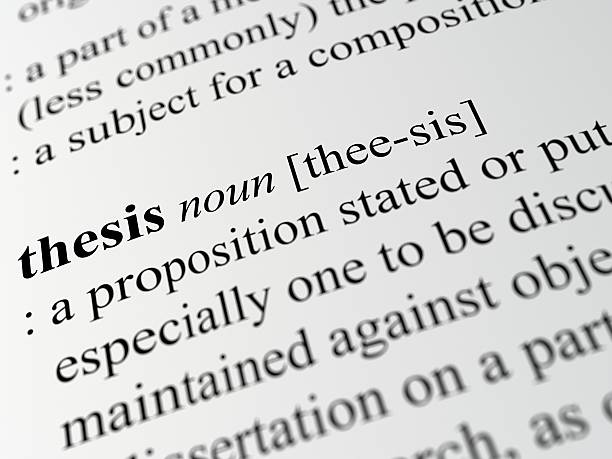To start, realize that writing a thesis statement is not just about writing—it’s about thinking and learning. You can do it, but you’ll have to learn how. The first step is to clarify what a thesis is, and what it isn’t. It’s not a research paper; that’s something else entirely. A thesis (often called a ‘dissertation’ in other disciplines) is an original piece of academic writing created by the person who will present it as their capstone work at their graduation ceremony or another similar event. Its somewhere challenging to learn how to write a thesis. In fields such as English, History or Psychology, the thesis (or dissertation) often takes the form of a book-length work; however, the purpose and process of writing one are broadly similar across disciplines.
Thesis writing can seem really difficult and daunting at first, but once you get into it and understand what you have to do, it gets much easier.
Here’s the basics on how to write a thesis:
1. Understand the basic structure
2. Learn how to organize your thoughts
3. Get help if you need it
4. Keep track of time
5. Write in chunks
6. Revise, revise, revise
7. Make sure it’s done on time
Here are some tips for tackling this task:
- Be realistic about time. If you’re short on time, then don’t make the mistake of thinking you can write an outstanding thesis in a couple of days. You’ll have to sacrifice sleep and probably won’t have time to go out with friends or even see your family for a while, but it’s worth it when you’re done—and remember, you’ll still be able to go out with friends once you’re done. Just make sure to leave plenty of extra time for writing if this is a concern for you.
- There’s no shame in asking for help. Whether you’re stuck on a specific aspect of your Thesis writing or just want someone else’s opinion on it as you work through the process, there’s no shame in seeking assistance from someone who knows what they’re doing—in person or online (there are tons of forums and blogs out there that can help).
- It’s hard to pull off a good thesis statement. It’s not a topic sentence, it’s not an objective, it’s not even a question. It does all kinds of other things: it reflects your voice, it makes a promise of what the body paragraphs are going to be about, and it’s a challenge to squeeze into 1-2 sentences.
- Thesis statements are like underdogs—they seem like they should be easy, but they come with lots of baggage. They can be more difficult than you think they’ll be, so here are some tips for tackling this dreaded task:
- Even if your future GPA isn’t on the line, there are plenty of reasons to feel nervous about your Thesis paper: it’s a reflection of you and the time you’ve spent at this university, and it’s a step toward your future.
- There are a few things you can do to feel less stressed about thesis writing. One is to treat it like any other paper—set a goal for yourself and block out time to knock it out. You can set a daily quota on your word count, or mark out an entire day to get it done and don’t let yourself be distracted by anything else that day.
- Just remember that it’s okay if you don’t hit your quota every day—or even every week—because as long as you get there in the end, no one will care how many drafts it took you.
- Another tactic is to find a way to relate your thesis statement to a larger goal for the school, whether that’s finishing strong for a senior year or graduating with honors.
- When your thesis writing is due, there’s a lot on the line. You’ve been working hard all semester, and now it’s time to finally show off all that research you’ve done. The pressure is on. Beating the stress is simple: take a breath, get in the zone, and write like you know what you’re doing.
- Read through your topic: Get familiar with the subject matter
- Break down your topic into smaller topics: Try to get an idea of how detailed you need to be
- Write down a list of questions: Brainstorm things that might come up in your research.
Elaborate Steps to Write a Thesis:
- When you write a thesis, you’re writing a sort of outline that explains your ideas as concisely and clearly as possible. It’s kind of like a short piece of fiction, with all the same elements: plot, characters, setting, plot twists and even dialogue.
- Your Thesis statement should present a clear, logical argument for why you believe something to be true. The most important part is to decide on an opinion or claim about whatever topic you’re writing about. Your thesis writing may sound like this: “The people who live in California are better than those who live in New York.”
- Plan your research and outline the topic you want to write about.
- Find a place to write your paper. It can be online or offline. Online may be more convenient, but you will likely encounter distractions such as social media and email. Offline is quieter, which is good if you write at home or in another environment where quietness is necessary.
- Drafting your paper. At this point, draft your paper’s first part and ensure it follows MLA or APA. Organize your ideas into sections and subheadings. In each section, state one main point as clearly as possible. Support this main point with facts and figures from your research materials or other reliable sources; do not just assume that your audience knows all about the subject matter you are writing about.
- Summarize all of the points in each section together in one place at the end of your paper/presentation/report/book/article (etc.).

Remember: The hardest part is getting started. You might feel anxious or worry that you don’t have enough information to write an effective thesis statement – but, as long as you have one strong idea, you’re on the right track.
Frequently Asked Questions
When you’re writing a thesis statement, you need to remember that the purpose of this statement is to convince your audience that what you are saying is true. You want them to accept what you say as trustworthy so that they will be confident that your argument has merit and should be taken by society as fact.
A good thesis statement should be simple, clear and concise. In other words, it should be easily understood by someone who does not care about the details of what the author has written or said before him/her.
The best way to develop a strong thesis statement is by brainstorming with other people who know about the subject matter under discussion. They can help you identify keywords that would support or refute your argument and give them an idea of how strong the statement will be from their perspective.
The purpose of a thesis statement is to provide the reader with an understanding of what you are trying to prove or disprove. It should be clear, and it should be specific enough that it limits your argument. A good thesis statement will make the reader interested in reading more about your topic and give him/her a clear understanding of why you chose this particular topic for discussion.
A topic sentence is a statement that provides the reader with an idea of what you are going to be discussing in your essay. It should be clear, and it should be specific enough that it limits your argument. A good topic sentence will make the reader interested in reading more about your topic and give him/her a clear understanding of why you chose this particular topic for discussion.
Yes, It is best to restate your thesis statement in the project’s conclusion. The purpose of a thesis statement is to clearly state what position you are taking on a subject and why.
In conclusion, you are reinforcing your place and making sure that the reader clearly understands your point of view. It also helps bring home a critical issue you want readers to remember.


